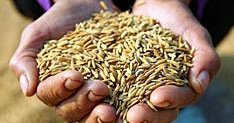At the 3-5 June 2008 World Food Security Conference in Rome called by the UN Food and Agriculture Organization (FAO), a growing consensus became manifest that radical measures are needed in order to deal with the current world food crisis. These measures will have to be taken in a wholistic way, with actions going from the local level of individual farmers to the national level with new government policies, to measures at the multi-State regional level such as the European Union or the African Union, and at the world level with better coordinated actions through the United Nations system.
The world requires a World Food Policy and a clear Plan of Action
Today, cooperation is needed among the UN family of agencies, national governments, non-governmental organizations, and the millions of food producers, in order to be able to respond to the food crisis that has already led to destabilizing food riots. There is a need for swift, short-term measures to help people now suffering from lack of food and malnutrition due to high food prices, inadequate distribution, and situations of violence. Such short-term actions require additional funding for the UN World Food Programme and the release of national food stocks. However, it is on longer-range and structural issues where we shall focus our attention. The world requires a World Food Policy and a clear Plan of Action.
The June FAO World Food Security Conference has been prepared by a number of meetings of national agricultural specialists starting from January, this year. The main aim was to look at the longer-range consequences of climate change on agricultural production, and thus to convene a conference of specialists with a handful of Ministers of Agriculture in order to show that climate change was being taken seriously. However, food riots in different parts of the world resulting in political instability changed the nature and the make up of the conference.
Riots and violence all over the world because of the food crisis
Food riots in Haiti brought the issue of hunger to the front gates of Haiti’s presidential palace and death to a UN peacekeeper from Nigeria, who was shot by the crowd surging from a slum area of Port-au-Prince. The Prime Minister, Jacques-Edouard Alexis, was forced to resign for having failed to act despite sharp increases in the price of food over the past several months, pushing people who were already poor into deeper poverty. The President of Haiti, René Préval, who was trained as an agronomist and should have recognized the consequences of food shortages earlier, nevertheless, promised to use foreign funds originally destined for development projects to lower the price of rice.
Rising food prices are a global concern and have led to riots against high food prices in a growing number of countries such as Egypt, Senegal and Cameroon. Using government funds to lower prices can only be a short-term policy. Egypt already spends more on subsidies, including gasoline and bread, than on education and health combined. The United Nations food specialists indicate serious food shortages in many countries of Africa: in East and Southern Africa: Lesotho, Swaziland, Zimbabwe, Somalia, Mozambique, and Eritrea; in West Africa: Mauritania, Senegal, Liberia, Sierre Leone, Ivory Coast, Burkina Faso, and Cameroon.
Importance and weaknesses of the FAO Conference
That is why the Conference in Rome received so much attention by the highest national authorities, as 43 Heads of government were present in person, while the other governments were represented by the Ministers of Agriculture. The world’s funding agencies were all there, pledging for an increase of funds. There were representatives from inter-governmental organizations such as the European Union as well as non-governmental organizations (NGOs) and a larger-than-usual press corps.
However, the agreements reached during the preparatory phase on longer-range planning in the light of climate change were largely put aside and attention was given in particular to the current crisis. As these crisis issues had not been at the center of the preparatory phase, no important agreements could be reached. It is impossible to negotiate with over 180 delegations, often headed by political leaders who want to make a speech useful for domestic reasons and then leave. The political speeches have been, nevertheless, a good indication of what issues are central and what agreements may be reached at a later stage. Spain, therefore, proposed to host a follow-up conference in Madrid in November or December. Between now and then, government specialists will work on formulating policies on which agreements can be made.
Developing alternatives before November
Thus, the period from June to November 2008 is crucial for NGOs interested in a world food policy. It is impossible for NGOs to modify the policies of governments during a conference. It is during the preparatory phase that governments are willing to consider new ideas. Many of these ideas are, in fact, not new. They have been lying around for some time but not put into practice and not structured in a wholistic way. As the US economist Milton Friedman wrote: “Only a crisis— actual or perceived — produces real change. When the crisis occurs, the actions that are taken depend on the ideas that are lying around. That, I believe, is our basic function: to develop alternatives to existing policies, and to keep them alive and available until the politically impossible becomes politically inevitable.”
Only a crisis— actual or perceived — produces real change. When the crisis occurs, the actions that are taken depend on the ideas that are lying around
In the next couple of months, it will be important for NGOs to discuss food policy at the EU Secretariat and with French officials, as France will chair the EU Presidency. Agricultural policy has always been a priority in France’s EU activities and France will consequently be likely to play a major role in trying to build a European consensus on food and agriculture for the follow up conference in Madrid.
However, a world perspective is needed. A world food policy for the welfare of all requires a close look at world institutions and patterns of production and trade. As Stringfellow Barr wrote in his 1952 book Citizens of the World “Since the hungry billion in the world community believe that we can all eat if we set our common house in order, they believe also that it is unjust that some men die because it is too much trouble to arrange for them to live.”


Follow the comments: |
|
